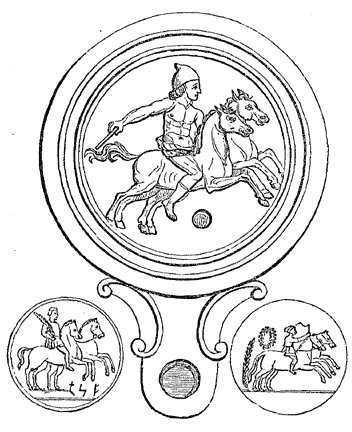
Desultor
Encyclopedia

Latin
Latin is an Italic language originally spoken in Latium and Ancient Rome. It, along with most European languages, is a descendant of the ancient Proto-Indo-European language. Although it is considered a dead language, a number of scholars and members of the Christian clergy speak it fluently, and...
"one who leaps down") has been applied to individuals skilled at leaping from one horse or chariot to another.
As early as the Homeric times, we find the description of a man, who keeps four horses abreast at full gallop, and leaps from one to another, amidst a crowd of admiring spectators. Eustathius
Eustathius of Thessalonica
Archbishop Eustathius of Thessalonica was a Greek bishop and scholar. He is most noted for his contemporary account of the sack of Thessalonike by the Normans in 1185, for his orations and for his commentaries on Homer, which incorporate many remarks by much earlier researchers.- Life :After being...
on Homer's Iliad, Lib. IV, assures us that riders might have up to six horses all abreast. In the games of the Roman circus
Circus
A circus is commonly a travelling company of performers that may include clowns, acrobats, trained animals, trapeze acts, musicians, hoopers, tightrope walkers, jugglers, unicyclists and other stunt-oriented artists...
, this sport was also very popular. The Roman desultor generally rode only two horses at the same time, sitting on them without a saddle, and vaulting upon either of them at his pleasure. He wore a hat or cap made of felt. The taste for these exercises was carried to so great an extent, that young men of the highest rank not only drove bigae
Biga (chariot)
The biga is the two-horse chariot as used in ancient Rome for sport, transportation, and ceremonies. Other animals may replace horses in art and occasionally for actual ceremonies. The term biga is also used by modern scholars for the similar chariots of other Indo-European cultures, particularly...
and quadriga
Quadriga
A quadriga is a car or chariot drawn by four horses abreast . It was raced in the Ancient Olympic Games and other contests. It is represented in profile as the chariot of gods and heroes on Greek vases and in bas-relief. The quadriga was adopted in ancient Roman chariot racing...
e in the circus, but exhibited these feats of horsemanship.
Among other nations, this level of equestrian dexterity was applied to the purposes of war. Livy
Livy
Titus Livius — known as Livy in English — was a Roman historian who wrote a monumental history of Rome and the Roman people. Ab Urbe Condita Libri, "Chapters from the Foundation of the City," covering the period from the earliest legends of Rome well before the traditional foundation in 753 BC...
mentions a troop of horse in the Numidia
Numidia
Numidia was an ancient Berber kingdom in part of present-day Eastern Algeria and Western Tunisia in North Africa. It is known today as the Chawi-land, the land of the Chawi people , the direct descendants of the historical Numidians or the Massyles The kingdom began as a sovereign state and later...
n army, in which each soldier was supplied with a couple of horses, and in the heat of battle, and when clad in armor, would leap with the greatest ease and celerity from a horse which was tired or disabled, upon the back of the horse which was still sound and fresh.

